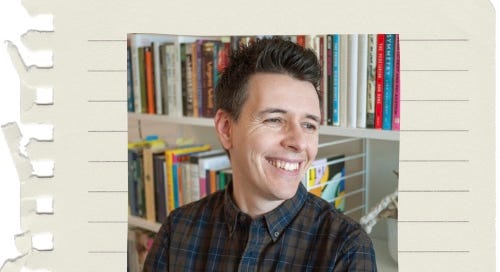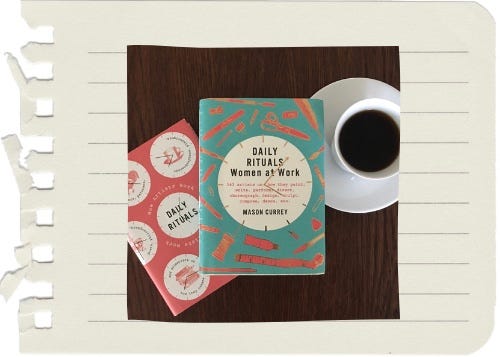Author Interview: Mason Currey on daily rituals
When a piece of writing suddenly comes together; it’s like magic
All those established authors, do you see them?
They were once young writers. That means that they’ve had some experiences and they’ve got some wisdom to share.
In today’s author interview, I am very pleased to welcome, Mason Currey.
Mason is the author of the Daily Rituals books, featuring wonderful insights into the day-to-day working lives of more than 300 great creative minds.
I’ve read both of his books and they are a great sneaky peek behind the curtains of how creatives live and a great reminder that everyone’s creative process is uniquely their own.
Mason is currently working on a new nonfiction book and writing the Subtle Maneuvers newsletter here on Substack. He lives in Los Angeles.
Read about his writing experience, then go in the running to win a copy of one of his Daily Rituals books - either the original Daily Rituals or Daily Rituals - Women at work.
What has writing taught you about yourself? How has it helped you grow as a person?
I think it’s helped me figure out who I am, what I’m really interested in, what kinds of ideas or experiences excite me—though this is definitely still an ongoing process!
As a young writer, what was the biggest challenge you faced?
Lack of confidence, and being overly self-protective. I wanted to write but I was afraid to put myself out there, and I think that slowed my growth as a writer and as a person.
I love the writer Sigrid Nunez, and she said in a 2018 interview: “I became a writer because it was something I could do alone and hidden in my room.” Me too! But as a young writer I think I was a little too invested in staying hidden in my room.
Was there a particular influence, person or situation who helped you to believe in yourself as a writer?
In my mid-twenties, I got a job as a junior editor at an architecture magazine in New York, and that made a huge difference for me. Not because I really wanted to be writing about architecture but because I suddenly had to produce a lot of writing on deadline, in a lot of different formats, and this helped me be much less precious about writing. I also learned how much editing a piece of writing can take—so much! Almost any sentence, any paragraph can be improved from its original version.
What do you love most about writing?
Mostly I don’t love the act of writing. It can be such a struggle to figure out what you’re trying to say and to say it in a compelling way. But I do love that feeling when a piece of writing suddenly comes together; it’s like magic. When the writing is going well, I experience a kind of fizzy elation that I don’t get in any other area of my life.
What do you find most difficult about writing?
I think it’s this: I can tell when something is not quite right, but generally I don’t know what to do to make it right. And there doesn’t seem to be any way to figure it out except by trial and error. And, often, when I’ve finally churned through all the wrong ways to write something and found the right way, the solution seems so obvious! I’m always wishing I could get to the good result without so much wasted effort, but of course that effort is not really wasted.
How would you describe the creative process?
I think my books and my newsletter are a way of trying to describe it, trying to do justice to its inherent slipperiness, unpredictability, and almost comical inefficiency. But it’s too complex to be summed up in a single statement; that’s what keeps me writing about it. It’s like what the painter Grace Hartigan once wrote in her journal: “Art cannot be seized head on, it must be stalked, it is elusive.”
What’s one secret about your writing process that you haven’t shared publicly? Or a quirk, you’d be happy to share?
I have a couple quirks! I get up early to write, and there is a particular boiled-wool scarf that I must have draped over my shoulders in order to begin. I also at some point got attached to grinding precisely 50.3 grams of coffee for the daily pot of coffee that my wife and I share. I’m not sure why! The number just feels “right.” Though I’ve written a great deal about others’ rituals, I’m not too interested in interrogating my own.
Do music, films or visual art support or nurture your writing in any way? How?
Yes, very much! Sometimes I find music, films, and visual art more important to my writing life than books or other written works. It’s like I can better recognize the feeling I’m trying to create on the page when I encounter it in a different medium. I wish there were a better word than “vibes,” but that’s what I’m after: the vibe of an artist, in any genre, being fully alive to the difficulties of the problem they’re trying to solve, and coming up with a novel solution that is authentically their own. That’s what I’m trying to do, too.
If you could give the young writer within you some advice knowing what you know now, what would you say?
I would suggest googling the terms “fixed mindset” vs.“growth mindset.” You want the latter! The thing to realize is that your writing is not a referendum on how brilliant or talented you are as a person—it’s a practice that you want to get gradually better at over time. If you can accept that, then I think you’ll save yourself so much frustration and angst.
Win a copy of one of Mason’s Daily Rituals books
Let me know, is there a ritual that helps your writing? And which of the Daily Rituals books would you like to win?
Comment below or email me at jodiebenveniste@substack.com by 28 July 2023 to be in the running.









My ritual is to re-read the last page or two of the work I did the day before. Then for about 10 - 20 minutes I meditate on what the characters do next. It allows them to take the wheel so to speak - to drive the story as opposed to my mind choreographing the next scene. It is, afterall, they're story. If I get to choose which one of Mason' books to receive, it would be Daily Rituals - Women At Work. Thank you for this opportunity.
Wow… this was really inspirational. As a young writer myself, it is really amazing to read about other people who are in the same situation. To get good ideas for my writing, I go outside and look around at things until one comes into my head! Sometimes the smallest things spark the biggest ideas.